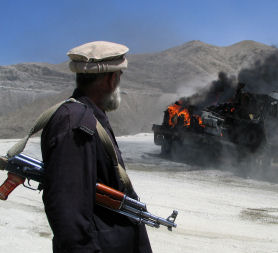War files leak: timing threatens US-Pakistan relations
US-Pakistan relations face new strain as a major data leak leads to fresh allegations of Pakistani support for Afghan rebels. Dr Farzana Shaikh, Chatham House talks to Channel 4 News.

Among the 200,000 military files, published online by Wikileaks, there are numerous logs which fuel fears that Pakistan is playing a “double-game” in Afghanistan.
One report shows an apparent warning that Pakistani agents and al-Qaida operatives were working together on a mission, another revealed US suspicions that ISI (Inter-Services Intelligence) officers were involved in an lleged plot to kill President Karzai.
Although the accuracy of the files is disputed, these revelations could seriously undermine already fragile US-Pakistan relations.
“None of this is surprising and it will not come as a surprise to US officials, the US public, or to observers of Pakistani politics,” Chatham House’s Dr Farzana Shaikh writes for Channel 4 News.
“But what is interesting, and disturbing, is the timing [of the leak]. At the moment the US is keen to stabalise relations with Pakistan in order to secure a viable settlement in Afghanistan where, according to many US officials, everything depends on Pakistan.The US is trying to craft some type of co-operative strategy with Pakistan for Afghanistan, while it also tries to balance relations with India.
“President Obama knows Pakistan is crucial for peace in Afghanistan, but is mindful not to jeopardise US relations with India, which has grown increasingly wary of America’s close ties with Pakistan – seeing it as a ’tilt’ in favour of Pakistan.
“Of course the US has become exasperated with Pakistan, angry at a so-called ‘double-game’, which is vehemently denied by Pakistan. Indeed, Pakistan is adamant it is a reliable ally. But US officials have made no secret of the fact Pakistan is ‘not doing enough’.
“US Navy admiral Mike Mullen, the Chairman of the Joint Chiefs of Staff, has already been outspoken about Pakistan’s lack of control over rebel groups, while US Secretary of State Hilary Clinton is on record as saying she believes there are ‘some Pakistani officials who know the whereabouts of Osama bin Laden and Mullah Omar.’
“It would appear that the US knows exactly what is going on but is extremely reluctant, at this delicate stage in a war that seems to be going wrong in Afghanistan, to antagonise a key (and not always easy) ally. Pakistan has also long been suspected by Afghan officials of ‘game-playing’, whose objectives are ‘nothing short of nefarious’.The US is also keen not to be perceived especially by Pakistan as planning once again to leave the region in the lurch, like it did in 1989 [at the end of the Soviet-Afghan war].
“US officials are keen to convey the message that this time things have changed – there will be no repeat of 1989, but that that requires reciprocity on the part of Pakistan, which must be prepared as much as the US to go the extra mile restore trust between the two sides. America is keen to control information and reports that could upset the very delicate relations at this time – between the US and Pakistan.
“But, for example, the ISI allegations [which include an apparent plot to kill the Afghan president] have been shown not to be very credible. If the substance of the leaks does turn out to be true, however, the US will struggle to convince public opinion. And it would also be extremely embarrassing for Pakistan’s army chief General Ashfaq Kayani who [on Friday 23 July] was handed three more years in charge – to ensure continuity in the fight against Islamist militancy.
“General Kayani headed the ISI from 2004 to 2007, which falls bang in the middle of the period in which the agency, according to these Wikileaks, is said to have aided and abetted the Taliban. This could be potentially very embarrassing as US officials have repeatedly declared they repose absolute trust in General Kayani.
“So if the leaks do contain evidence that can be conclusively proved, they are likely to upset a carefully crafted apple-cart in which the Obama administration has invested heavily.”
Dr Farzana Shaikh is an Associate Fellow of Chatham House. She is an expert on politics and humanitarian issues in Afghanistan and leads the Pakistan Study Group, focusing on the theme “Unravelling Pakistan: Threats to Stability”.
Pakistan 'links to al-Qaida'
The Wikileaks documents also show that according to intelligence received by the US military, the Inter-services intelligence (ISI) of Pakistan, are involved in many different ways in Afghanistan.
One incident Wikileaks tells Channel 4 News is a warning that ISI agents and five al-Qaida operatives are working together on a mission, crossing into Afghanistan from Pakistan to carry out an attack.
One of the most interesting incidents, Wikileaks says is an attempt by an ISI officer to assassinate Afghan president Hamid Karzai, through a Taliban contact.
-
Latest news
-
Laughing Boy: New play tells the tragic tale of Connor Sparrowhawk5m

-
Sewage warning system allows some of worst test results to be left off rating system, analysis shows3m

-
Post Office inquiry: Former CEO didn’t like word “bugs” to refer to faulty IT system4m

-
Israeli soldier speaks out on war in Gaza12m

-
PM’s defence spending boost should be ‘celebrated’, says former Armed Forces Minister4m

-




